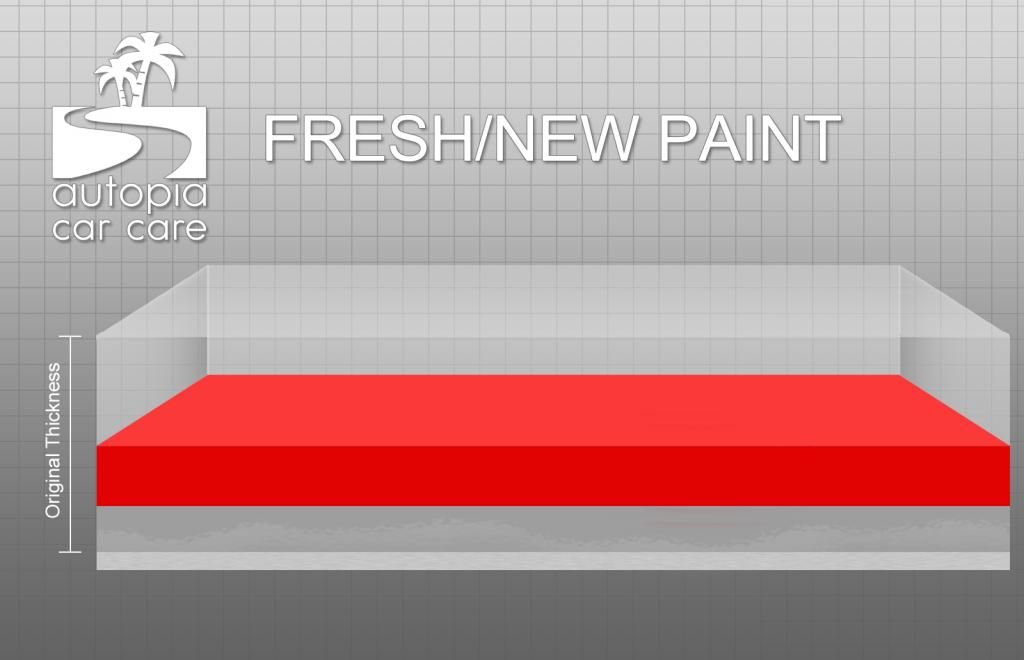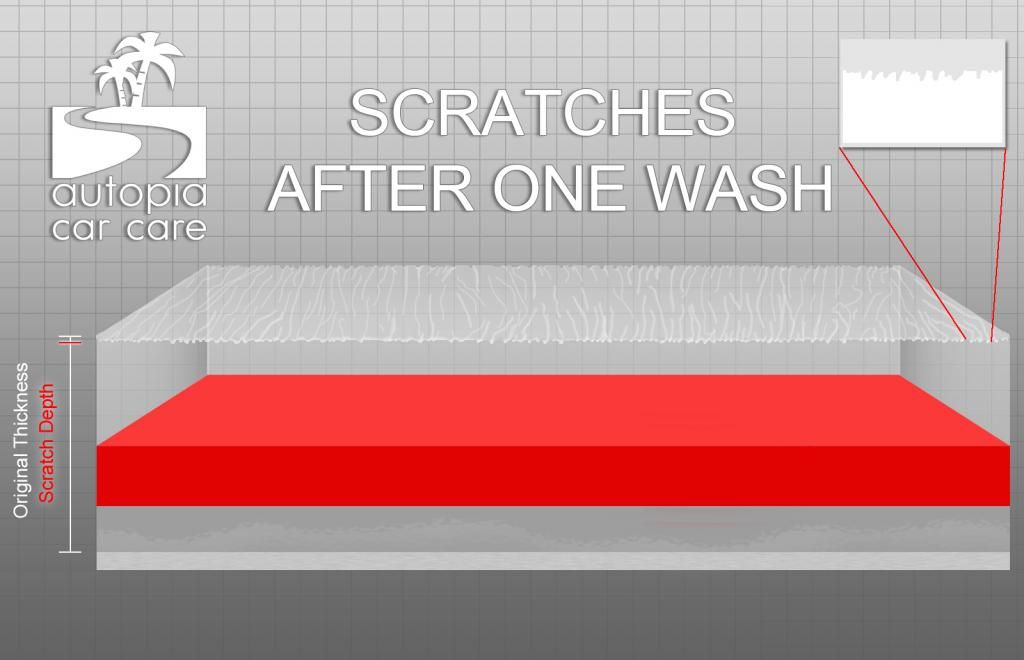Todd@RUPES
Just a regular guy
One of the most common questions you have as a detail enthusiast (or professional) is "aren't those machines bad for your paint?". It's very easy to understand why this question garners so much attention...
However, the real question shouldn't be whether polishing is bad for your paint, but rather, "How much damage does ONE bad car wash do?"
For those new to detailing, the thought of running a machine over the paint is quickly followed by the fear of removing too much paint, damaging the clear coat, or overheating the paint to the point of creating thermo-damage. All understandable fears, but let's really look at what happens to your paint during both the poor washes and correct polishing...
First, in the graphic below, we have fresh paint. The surface of the clear coat (tinted white in the graphic) is perfectly smooth, and thus highly reflective.

Second, in the graphic below, we subject our paint finish to less-than-ideal wash procedures. While the thought of using a machine (which is engineered to work on paint), polishes (engineered to work on paint) and pads (engineered to work on paint) is scary, the truth is that improper wash techniques are far more abrasive.
Any dirt, dust or even a rough towel will quickly cover your paint in thousands, if not millions, of microscopic scratches. While each scratch is extremely shallow, your paint is very thin. Typical clear coats are less than the sheet of a paper thick....
Rocks, leaves, sand particles and even insect remains can create much deeper scratches in the clear coat.
A scratch, by definition, is any time material is removed from the surface (a scuff would be when the surface has been altered).

In the third, and final, graphic we can see the surface after it has been polished. Once scratched, the surface will have a cross-section that looks much like mountain range. Correct polishing simply cuts off the top of these mountains. In other words, polishing the paint corrects the finish by removing the material that improper washing/drying created...
Here is another scary thought to consider. It can take 10 hours or more to polish away the swirl mark scratches created by ONE improper wash!

So is polishing bad for your paint? If we define bad as abrasive, then the answer is it is far safer to polish your paint than it is to wash incorrectly. While there is learning curve when it comes to polishing, there is also a learning curve when it comes to correct washing techniques.
Polishing uses controlled, precise, invisible scratches to slowly remove the peaks of the scratches created. Because proper polishing is done with materials designed to fix paint, and done precisely, it takes far longer to remove the material surround the scratch then create them in the first place.
Next time somebody offers the words of wisdom "Your gonna polish the paint off your car" an appropriate respond could be "long after you wash the paint off yours..."
To learn more about proper washing, drying and polishing techniques check out the Autopia-CarCare How-To Guides
However, the real question shouldn't be whether polishing is bad for your paint, but rather, "How much damage does ONE bad car wash do?"
For those new to detailing, the thought of running a machine over the paint is quickly followed by the fear of removing too much paint, damaging the clear coat, or overheating the paint to the point of creating thermo-damage. All understandable fears, but let's really look at what happens to your paint during both the poor washes and correct polishing...
First, in the graphic below, we have fresh paint. The surface of the clear coat (tinted white in the graphic) is perfectly smooth, and thus highly reflective.

Second, in the graphic below, we subject our paint finish to less-than-ideal wash procedures. While the thought of using a machine (which is engineered to work on paint), polishes (engineered to work on paint) and pads (engineered to work on paint) is scary, the truth is that improper wash techniques are far more abrasive.
Any dirt, dust or even a rough towel will quickly cover your paint in thousands, if not millions, of microscopic scratches. While each scratch is extremely shallow, your paint is very thin. Typical clear coats are less than the sheet of a paper thick....
Rocks, leaves, sand particles and even insect remains can create much deeper scratches in the clear coat.
A scratch, by definition, is any time material is removed from the surface (a scuff would be when the surface has been altered).

In the third, and final, graphic we can see the surface after it has been polished. Once scratched, the surface will have a cross-section that looks much like mountain range. Correct polishing simply cuts off the top of these mountains. In other words, polishing the paint corrects the finish by removing the material that improper washing/drying created...
Here is another scary thought to consider. It can take 10 hours or more to polish away the swirl mark scratches created by ONE improper wash!

So is polishing bad for your paint? If we define bad as abrasive, then the answer is it is far safer to polish your paint than it is to wash incorrectly. While there is learning curve when it comes to polishing, there is also a learning curve when it comes to correct washing techniques.
Polishing uses controlled, precise, invisible scratches to slowly remove the peaks of the scratches created. Because proper polishing is done with materials designed to fix paint, and done precisely, it takes far longer to remove the material surround the scratch then create them in the first place.
Next time somebody offers the words of wisdom "Your gonna polish the paint off your car" an appropriate respond could be "long after you wash the paint off yours..."
To learn more about proper washing, drying and polishing techniques check out the Autopia-CarCare How-To Guides
